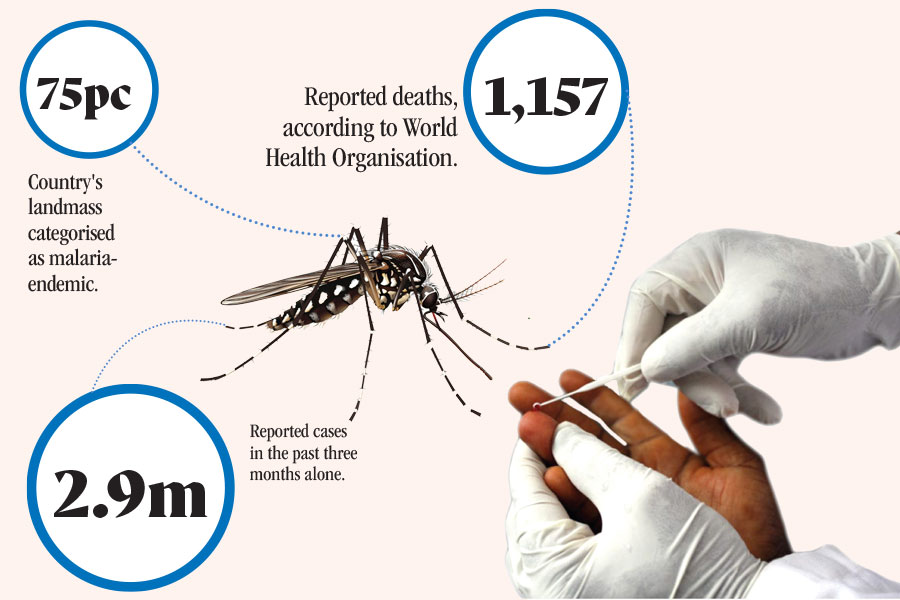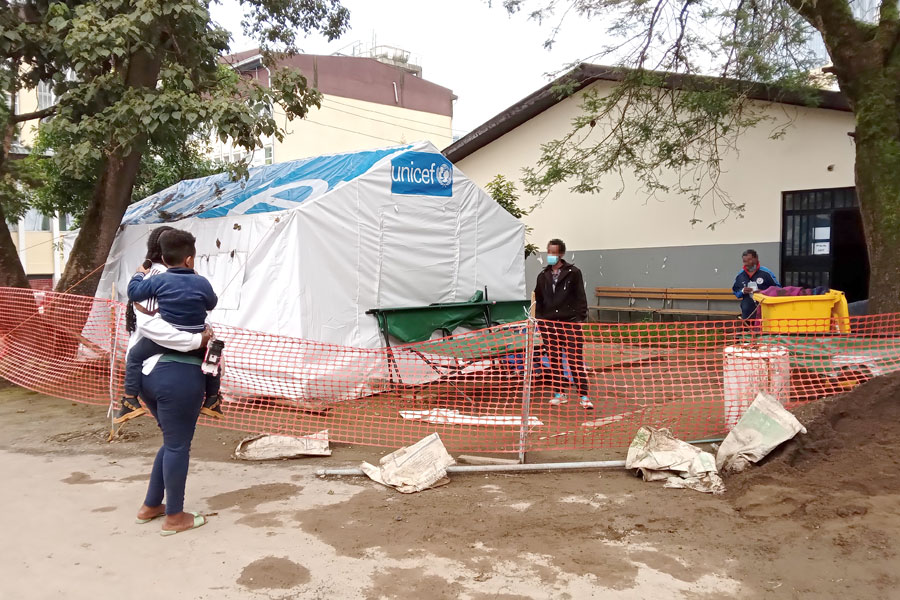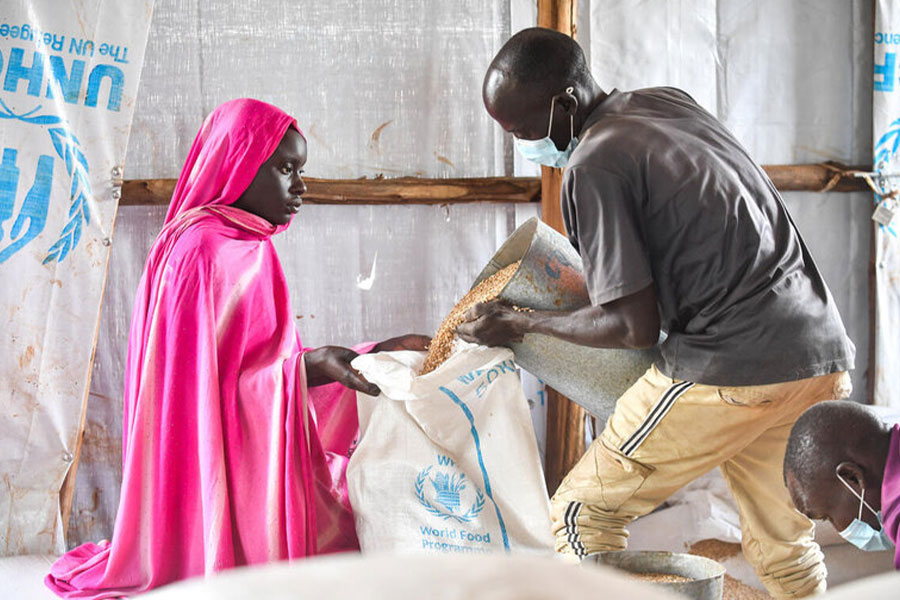
View From Arada | Nov 02,2024
In the tangled corridors of Amanuel Mental Specialised Hospital, 29-year-old Wondwessen Belete's footsteps echo stories of trauma and resilience. The Hospital, in the busy vicinity of Congo Street, is a reminder of Ethiopia's troubled past and a symbol of its mental health challenges today. It is the oldest facility in the country.
Amanuel's history is intertwined with the country's turbulent past.
Initially a general hospital built on a 1.4hct plot, its purpose shifted post-1941, after the traumatic Italian occupation, addressing the mental health impacts of the Rodolfo Graziani-induced three-day massacre in Addis Abeba. Now, under the aegis of the Ministry of Health, the facility juggles a budget of 198 million Br, with an influx of over 60,000 patients annually. Close to 33 million Br is sourced from its services, having 240 beds distributed across 11 wards.
Wondwessen was one of these patients admitted after experiencing a severe episode of alcohol-induced self-harm. He partially severed his two fingers in an alcohol-fueled rage following disagreements with his sister.
"I was heaving in rage," he told Fortune.
His family refused to give him a portion of the revenues from selling his minibus, worrying that he would spend it on drinks. He recalled spending three weeks on the streets of Kolfe Qeranyo District before family members took him to a facility. He voluntarily sought refuge in the Hospital's substance abuse ward, where he stayed for 10 days. The Hospital, according to Wondwossen, provides much-needed relief from outside stresses while easing family's concerns. The once-energetic taxi driver now finds solace in strolling the compound grounds, attempting to steer clear of the afflictions that haunted him.
"I need a few sober days," Wondwossen confided, a fresh bandage on his left hand visible, which has yet to recover from the damage. "I'll relapse if I leave now."
His words resonate with the silent pleas of many like him, seeking a haven in one of the country's two public psychiatry hospitals.
Yet, Amanuel’s story is not one of unbridled success. As Gezahegn Gamo, the hospital's head of public relations, somberly puts it, "No significant expansion has occurred since its foundation.”
The 46 general practitioners and 13 psychiatrists are far from adequate in addressing the growing demand, while many arriving for inpatient treatments were returned from the doors. A recent road expansion plan by the City Administration was no good news for staffers like Gezahegn. They fear it will slice a piece from the compound.
"It [the premises] would have benefited from trees and a greener atmosphere instead," he told Fortune.
The Hospital is not alone in this languishing state; the broader mental health landscape reflects a similar picture of unmet needs and resource scarcity. The statistics paint a daunting picture, although a mere five percent of studies focus on mental health in Ethiopia. There is a glaring gap in comprehensive data, even as indicators point towards a surge in self-harm over the past two decades.
A study Getachew Mullu and Amanuel Lemu conducted in 2018 revealed approximately 21.5pc of the population struggles with common mental health issues. Yet, mental health services are conspicuous by their absence. Only a quarter of health facilities out of the 400 hospitals and 3,706 health centres provide mental health services. Urban centres like Addis Abeba might fare slightly better, but regional states such as Benishangul Gumuz and Gambela remain direly underserved.
With a health worker-to-patient ratio half the continental average and a fourth of the number recommended by the Sustainable Development Goals (SDG), Ethiopia has a long road before realising universal healthcare.
Wude Shiferaw, a focal point person on mental health at the Disease Prevention & Health Promotion Directorate of the Addis Abeba Health Bureau, disclosed that the best way to address mental health concerns is by deploying professionals at every health service provider in the city. This is part of the decentralisation strategy the Ministry of Health laid out in successive national plans.
"We're continuously training and assigning new staff at every health centre," she told Fortune.
With around 120 specialised psychiatric doctors vying to provide services for over 100 million people, a troubling fact looms as the percentage of mental health professionals stands at less than one per cent of the total workforce.
The third-year psychiatry resident from Dila University, Bezawit Mandifraw, has had a lifelong dream of working in the mental health sector, coming close to completion as she approaches her final year. While she has had experience at her University's psychiatric wing, the scale of Amanuel has reinvigorated her desire to pursue further studies.
"I want to be able to do more," she told Fortune.
Within the walls of Amanuel, Endale Mamo, one of the 372 professionals, has been a beacon of hope for many. As a psychologist and counsellor for six years, he curates the art therapy centre – a space filled with profound artworks, each echoing the turbulent journey of its creator. Endale astutely observes the unaddressed traumas manifesting as substance abuse and suicidal tendencies.
"A teenager is less likely to handle the impact of stressors," he told Fortune, pointing to the alarming university entrance results.
Addressing this underlying trauma is at the heart of a pilot project helmed by Tigist Waltenigus, co-founder of Erq Ma'ed Psychosocial Support Service. Her initiative aims to provide psychological support to students, often an overlooked demographic.
"Teenagers barely get psychological support from their schools," she said.
In a country daunted by myriad challenges, including a prolonged civil war, droughts, inflation, and regional conflicts, the burden of mental health often remains unaddressed.
"Therapy is too expensive," Tigist candidly admitted.
The cost barriers are significant. With a single session at a private clinic, patients are billed around 1,000 Br.
A few establishments like Kotebe General Hospital, Gefersa Rehabilitation Centre, and Sitota Psychiatric Centre are trying to bridge the gap.
Yonas Bahiretibeb (PhD), founder of the 14-year-old Sitota Psychiatric Centre and one of the six such facilities in Addis Abeba, offers a nuanced perspective on the cultural underpinnings of mental health. A considerable number of mental health disorders are wrongly attributed to supernatural causes. This cultural framing sometimes undermines recovery, even though nuanced interventions could weave cultural and religious aspects into therapeutic approaches.
"Ethiopians have difficulty expressing their psychic pain," Yonas said, "rendering symptoms to appear in bodily sensations."
Once a resident in Toronto, Canada, Yonas emphasised weaving local resources from religion and culture with the emergence of superficial knowledge absorbed through social media in the urban landscape. While he recognised the traumatising impact of conflict on mental health, he noted the country had coped with a history filled with war through the strength of social institutions in previous centuries.
"People are losing their moral base with nothing to replace it with," he told Fortune.
He noticed a rise in recreational drug use in the capital, fueling a crisis of purposeful life in the privileged urban class.
"Drug-induced psychosis is all too common," he told Fortune.
Data from the Ministry of Health reveals that five per cent of mental, neurological and substance disorders arise from the consumption of "Khat", a widely used plant in the narcotic family. The prevalence of common mental illness stood at 21.6pc and 36.4pc in the general population and among patients with co-morbid conditions two years ago. The latest mental health atlas by the World Health Organisation (WHO) on Ethiopia revealed a 9.45pc suicide mortality rate out of 100,000 people, notwithstanding an under-reporting due to social stigma.
Policy interventions have, thus far, appeared limited. Even as national strategic plans on mental health are rolled out, tangible results remain sparse.
Jemal Teshome, senior expert on mental health at the Ministry, blamed funding squeezes due to the pandemic and conflicts for significant roadblocks.
"We recognise that trauma will become a public health issue in a few years," he told Fortune.
However, he remains hopeful, aiming to standardise access in 70pc of health centres across the country.
However, in a sector where professionals are often deterred by stigma and a lack of resources, Azeb Asaminew’s story stands out. Choosing to specialise in psychiatry, she faced scepticism from her peers. The clinical leader at Zewditu Hospital Psychiatry Department believes in integrating services into existing hospitals rather than constructing specialised ones.
Experts like Solomon Tefera (PhD) emphasised the urgency, noting the traumatic impact of conflicts and the rising tide of substance abuse like cocaine and LSD, insisting on its harmlessness. However, Solomon contested this view based on the growing number of patients he has treated.
"Conflicts lead to psychological trauma," said the revered psychiatrist and the founder of Renascent Rehabilitation Center. "I see several young adults with drug-induced psychosis."
However, as stories like Wondwossen's show, there is "resilience" despite the despair, signalling hope for the future. Resilience is a term that has been thrown around for years, but in Ethiopia, its depth and resonance hold a unique texture.
Grassroots community movements are slowly taking shape. The Ethiopian diaspora, many of whom have had firsthand exposure to more established mental health facilities overseas, are now crucial in bridging knowledge gaps.
Religious leaders and traditional healers are now being engaged in dialogues about mental health. Recognising their influential position in the community, NGOs and international partners offer training to integrate their services with modern therapeutic methods, encouraging a harmonious blend of the old and new.
Mental Health Users Association was founded five years ago by five individuals who have suffered from mental health issues. One of the co-founders is Eleni Misganaw, who has battled bipolar personality disorder for most of her life. Funded by members and philanthropists, Eleni believes in creating meaningful engagement on the issue. She said they strive to provide peer support for people shying away from medication or any intervention by showing them they are not alone.
"We wanted to remove the stigma," she told Fortune.
The journey, however, is not without its roadblocks. It is not just about building state-of-the-art hospitals or crafting well-researched policies, vital though they are. Ethiopia's mental health renaissance lies in its communal spirit, shared stories, and the collective belief in a better tomorrow.
As dusk settled over Amanuel, there was an unmistakable sense of optimism in the air, a silent acknowledgement that change was on the horizon. Once shrouded in whispers and hushed conversations, mental health is slowly stepping into the spotlight. Amanuel may reveal a country on the brink – one teetering between historical baggage and the promise of a better tomorrow. However, patients like Wondwossen show a newfound determination in their eyes.
You can read the full story here
PUBLISHED ON
Oct 28,2023 [ VOL
24 , NO
1226]

View From Arada | Nov 02,2024

Fortune News | Oct 18,2025

Viewpoints | Oct 24,2020

Viewpoints | Jul 13,2020

Covid-19 | Apr 17,2020

Fortune News | Apr 22,2023

Fortune News | Nov 11,2023

Fortune News | Nov 16,2024

Fortune News | Aug 05,2023

Radar | Oct 12,2025

Dec 22 , 2024 . By TIZITA SHEWAFERAW
Charged with transforming colossal state-owned enterprises into modern and competitiv...

Aug 18 , 2024 . By AKSAH ITALO
Although predictable Yonas Zerihun's job in the ride-hailing service is not immune to...

Jul 28 , 2024 . By TIZITA SHEWAFERAW
Unhabitual, perhaps too many, Samuel Gebreyohannes, 38, used to occasionally enjoy a couple of beers at breakfast. However, he recently swit...

Jul 13 , 2024 . By AKSAH ITALO
Investors who rely on tractors, trucks, and field vehicles for commuting, transporting commodities, and f...

Nov 1 , 2025
The National Bank of Ethiopia (NBE) issued a statement two weeks ago that appeared to...

Oct 25 , 2025
The regulatory machinery is on overdrive. In only two years, no fewer than 35 new pro...

Oct 18 , 2025
The political establishment, notably the ruling party and its top brass, has become p...

Oct 11 , 2025
Ladislas Farago, a roving Associated Press (AP) correspondent, arrived in Ethiopia in...